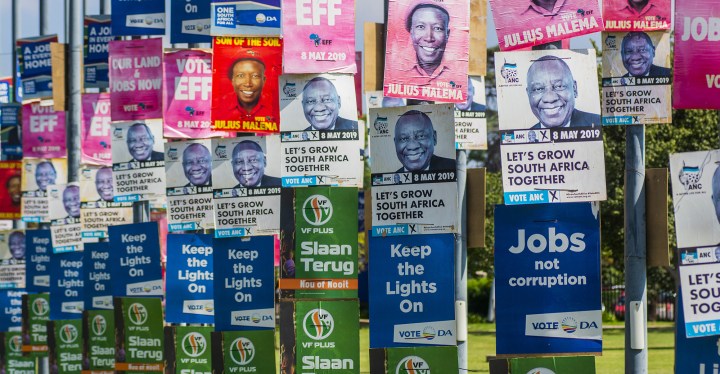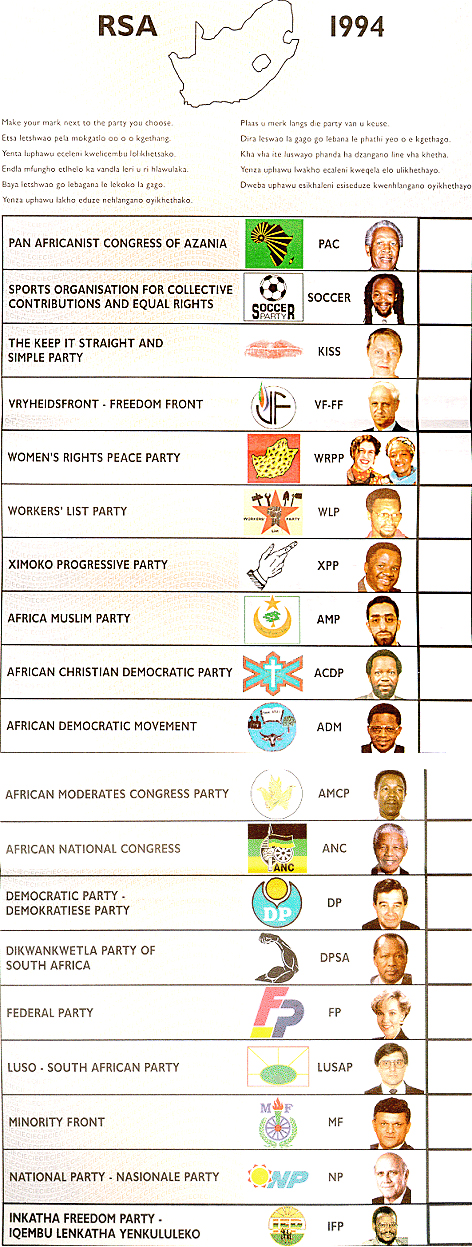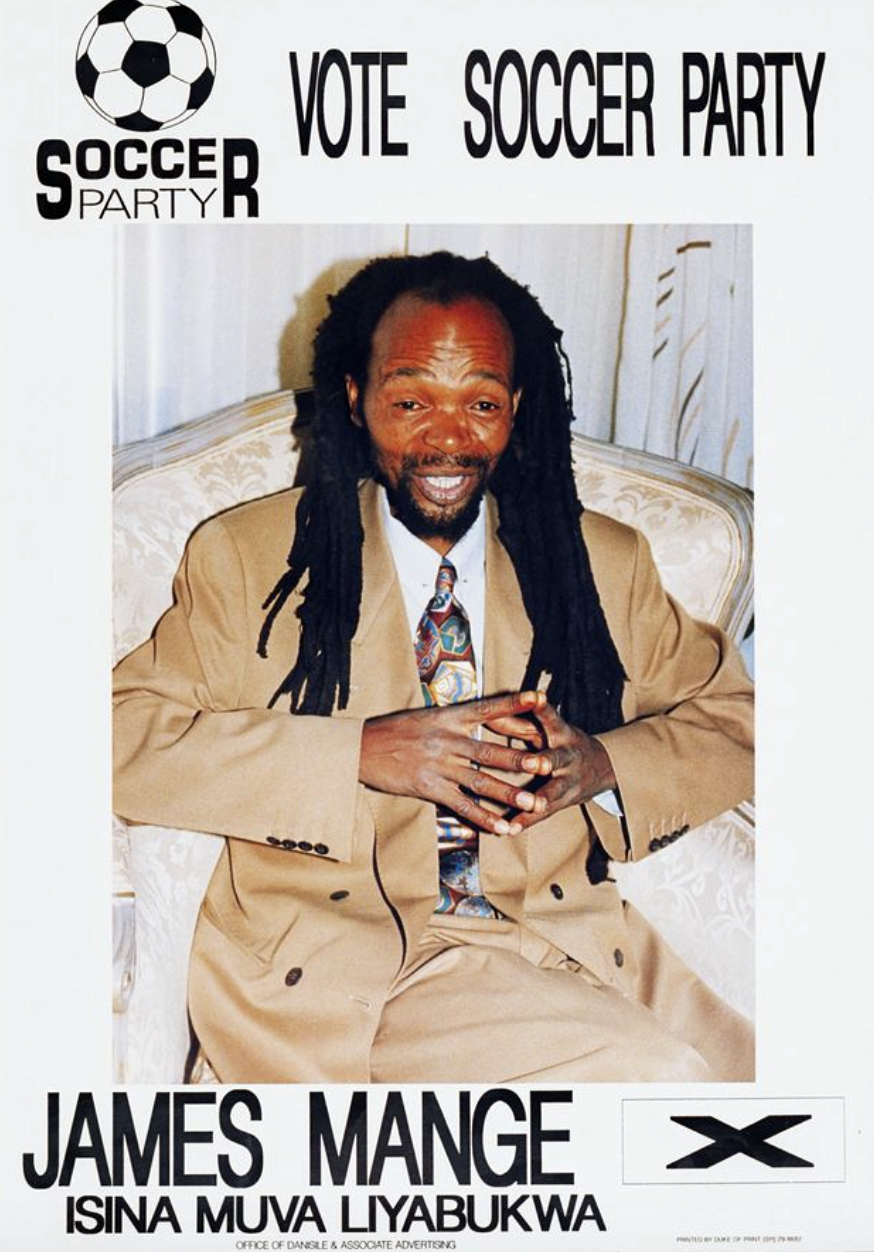ROAD TO 2024 ELECTIONS
Thirty years later, most parties who competed in 1994 elections have turned to political dust

In 1994, there was, unsurprisingly, a record number of new parties on the ballot for SA’s first democratic elections. This trend has continued, with some 200 parties predicted to contest next year’s general elections. A look back at 1994 raises the question: how many new parties last?
‘The current number of political parties is upward of 500, and 200 of that is parties that could potentially contest the [2024] national and provincial election,” Sy Mamabolo, the chief electoral officer of the Electoral Commission of South Africa (IEC), told the news media earlier this year.
Notwithstanding the logistical issues such a long list of parties holds for the IEC and the fact that some political analysts say the reason South Africans keep forming new parties is due to voters losing confidence in the existing parties, what are the chances of any of the new parties getting into the National Assembly? Pretty slim, says a brief look at past polls.
In 1994, there were 19 parties on the national ballot paper for South Africa’s first democratic election. Much excitement and anticipation heralded this momentous occasion, a life-changing moment for all South Africans.
After the long hours of counting, the ANC was firmly in the driving seat but most of the other 18 parties were gone.
Almost 20 million people voted in 1994. Only 1% of those voters put invalid/spoilt ballots into the box (193,112), and some of those ballots were possibly a consequence of the overwhelming majority of voters never having voted before and unintentionally rendering their ballots invalid.
Top five SA parties in 1994
Winning more than 62% of the national vote, which got them 252 seats, the ANC became South Africa’s first democratically elected governing party. Behind it, with just over 20% of the vote and 82 seats, was the National Party, followed by the Inkatha Freedom Party, with 10% of the vote and 43 seats.

South Africa’s 1994 elections ballot paper (Image: O’Malley archive)
Bringing up the rear was the Freedom Front, which won 2.2% and nine seats, beating the Democratic Party, which obtained 1.7% and seven seats. The FF garnered most of its votes in Gauteng.
Behind them were the Pan Africanist Congress of Azania with 1.2% of the votes and five seats, and the African Christian Democratic Party (ACDP), which squeaked into the National Assembly with two seats and 0.5% of the national vote.
The National Party, which came into power in 1948 and hardened segregation laws into the apartheid system, became the New National Party (NNP) in 1997 and merged with the ANC after a dismal performance at the national polls in 2004 when it got less than 2% of the vote.
The ACDP was founded by the Rev Kenneth Meshoe in the early 1990s. It is one of the longest-surviving parties, as is the former Democratic Party (DP), which became the Democratic Alliance (DA) in 2000.
A quick look at the history of the DA shows it is no stranger to mergers and coalition politics. The DP was established in 1989 when the Progressive Federal Party merged with two smaller parties and in 2000 it became the DA after a merger agreement with the Federal Alliance and the NNP ahead of the local government elections.
A year later, however, the NNP jumped ship and cosied up to the ANC. In brief, the NNP was absorbed into the ANC and had disappeared by 2005.
Noteworthy 1994 parties
Does anyone remember the Soccer Party (Sport Organisation for Collective Contributions and Equal Rights) which garnered just over 10,000 votes? For perspective, the party with the least amount of votes — 3,293 — was the Luso-South African Party.

The Soccer Party. (Photo: Supplied)
The Soccer Party was led by James Mange, who had been sentenced to death for high treason in 1979 when he was 24. However, an international campaign succeeded in getting Mange’s sentence commuted to two decades in prison. While in prison he formed a reggae band, The Whiplashes. He has released more than 10 albums, one entitled Robben Island. He is described as a freedom fighter, climate activist and musician.
Then there was the Keep it Straight and Simple Party, more well-known as the Kiss Party — which put lips on its posters. Founded by Claire Gaisford, the party stood in a few elections but never got more than 6,000 votes in 1994 and went quiet after 2014.
New parties keep coming up, but most don’t last
Following 1994’s record-breaking number of parties on the ballot, in 1999, there was a slight dip, with 16 parties on the national ballot. However, each successive election thereafter has seen the ballot paper grow.
In 2014, voters had 33 parties to choose from and in 2019, a bumper crop of 48 parties had many people uncertain about which party was looking out for their best interests and which had a realistic chance of getting seats.
Staying in the game is as challenging as getting in
Now, as then, getting a new party going is hard work. In 2024, independent candidates will be able to contest the elections for the first time and for them, it is even harder to get on to the ballot than for a new party.
As veteran activist Zackie Achmat, attempting to run in 2024 as an independent, told a gathering in Cape Town at the November launch of his campaign to get enough signatures to get on the ballot:
“In the past, political parties needed 1,000 signatures to register as parties. I have to collect 13,201 to get on to the ballot.”
He added: “We need at least 500 volunteers … we need a system to upload them [the signatures]…” and that as an independent he needs to also “get more than 80,000 votes, whereas a political party needs 47,000 votes, so I need double the amount of votes as the ANC, DA, EFF,” and any other party, to get into Parliament.
While the Constitutional Court recently ruled that independents only need 1,000 signatures to get on the ballot, they still face an uphill battle.
The ANC may pose less of a threat than in the past, considering its financial situation appears dire — with the Sheriff of the Court at Luthuli House last week, just another bump in the party’s battle to pay its bills, which has been ongoing for a while, as reported by Daily Maverick’s Ray Mahlaka in 2021.
A retired former ANC Cabinet minister and longstanding member of the party — whose membership predates the 1994 elections — told Daily Maverick that besides the hard, grinding work and many late nights that go into getting a party on its feet, the main obstacle for smaller parties boils down to one big thing.
“You have to have big money — it’s really big money. People don’t realise how hectic it is to run a party… In the past, we used to use our own money. Now you need backers.”
To see who is giving money where and get a sense of how much money is needed to keep a party afloat, go to My Vote Counts which has been keeping tabs on money going into party coffers since 2021 when the Political Party Funding Act came into effect.
The law states that “parties must disclose all donations above R100,000,” and “may not accept donations above R15-million a year from a single donor”. If you’re wondering who gives R15-million-plus a year to political parties, Daily Maverick’s Rebecca Davis found out.
Davis’s “Big Eight” confirms the retired ANC minister’s opinion that what blood is to a vampire, money is to politics: “People don’t understand — you just have to find money all the time.” DM


















Not all the votes were counted in 1994. In the end the result were negotiated between the parties.